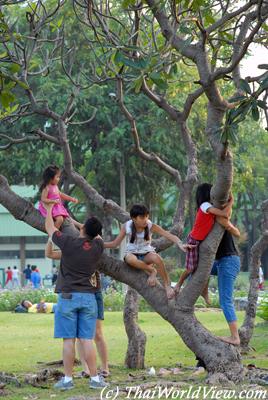
THAI FAMILY



Thai family has a hierarchy with the parents at the top of it. Children are educated to always honour their parents and to thank them for the time and money spent for education. Children shall have gratitude ("KATANJOO" - กตัญญู) towards their parents. The worst insult for a Thai people is to be deemed ungrateful.
Gratitude is the first qualification of a good person in Thailand. Father and mother are to be respected and honoured. Young people shall send money to support their parents until at least they get married.
Many words are used in Thai language to identify all the members of the family.
Within children there is also a hierachy.
When speaking to an elder, Thai children always use the word "PHI" ( พี่ ). When the difference of age is not important, they only use first name. Younger must respect elder, listen to their advice. Elder shall protect younger.
When families visit some Thai friends to present them by their new born baby, the friends may tell the baby is ugly (น่าเกลียด). This is an old Thai tradition in order to fool the evil spirits so that they wander somewhere else.
Grandmother and grandfather have also different names. Thai children must use four names instead of two in westerner countries.
Uncles and aunts have also different names. Thai children must use four names instead of two in westerner countries.

|
Thai family having fun in a Bangkok Lumphini park.
|
| Thai family |
|---|
The words "PHI" (พี่), "NONG" (น้อง), "LUNG" (ลุง), "PA" (ป้า), "YAI" (ยาย) are also used in everyday life with unknown persons. Thai people evaluate the age of the person in front of them and then use the correct word. For example, in a restaurant a waitress is called "PHI" or "NONG". In case of doubt about her age, "PHI" is used. A taxi driver in middle age is called "LUNG". A woman selling street food in middle age is called "PA". Older people more than sixty years old are called "YAI" or "PU".
To be more polite the word "KHUN" (คุณ) can be added before.
Even between friends, there is a hierarchy. The younger person use the word "PHI" (พี่). The elder person use the first name.
In ceremonies such as a marriage, when the couple thank everybody during a speech, they use the word "PHI-NONG" ( พี่น้อง ), which means all sisters and brothers. All guests are not from the close family but in villages, all are considered like a family.
Everything is a question of age and sex. Seniority is a important part of Thai society. A younger person shall respect the older person. When Thai children write letters to their parents, they often begin their letter with the words "FATHER, MOTHER THAT I RESPECT" (พ่อแม่ที่ฉันเคารพ).
Thai children used to live not far from their parents. A big part of the wages should be given to parents. Now things are changing. With the industrialisation of Thailand, many young Thai people go to Bangkok to take their chance. They almost continue to send money to support their parents. But parents, far away from their children, have less influence on them. In previous decades parents chose the mate. Nowadays many young Thai people choose on their own.
Often Thai children continue to live in their parent's house even if they are old enough to live their own life. Especially for girls, they should not leave their parent's home if they are not married. If a girl is living alone, everybody gossip that she is a bad girl or a "MIA NOI" (เมียน้อย), mistress of a wealthy man.
In Thailand there is no pension when workers retire. So the only support for the old parents are their children. Thai people don't like the westerner principle to send old parents in special nursing-home. They say it is not a nice way to thank parents for all the goodness they did. All the family shall live together. Children are the assurance for the parents.
| Home > Society > Thai Family |
| Page 1 | Page 2 | Page 3 |

|